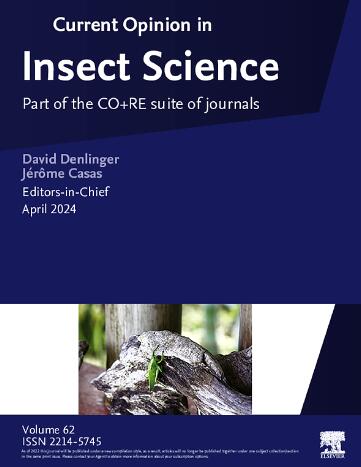Mosquitoes feeding on ectothermic hosts: from host seeking to pathogen transmission
IF 5.8
1区 农林科学
Q1 BIOLOGY
引用次数: 0
Abstract
While much research has centered on mosquitoes transmitting pathogens to mammals and birds, several species feed on cold-blooded hosts, including amphibians, reptiles, fish, and various invertebrates. Despite limited knowledge about these alternative feeding habits, delving into their biology offers valuable insights into the evolutionary origins of blood feeding and aids in developing comprehensive epidemiological models for vector-borne diseases. This review sheds light on these ‘alternative’ hosts, highlighting recent discoveries in this field and probing into the evolutionary theories surrounding blood feeding in mosquitoes. Additionally, we delve into the host-seeking cues used by ectotherm-feeding mosquitoes and the physiological and mechanical challenges inherent in feeding on cold-blooded animals, contrasting them with endotherm-feeding mosquitoes. Finally, we examine the pathogens these mosquitoes can transmit. While our understanding of mosquitoes with alternative hosts remains incomplete, this review synthesizes existing knowledge, offering insights into the biology and ecology of mosquito species that target cold-blooded hosts.
以体外宿主为食的蚊子:从寻找宿主到病原体传播。
虽然许多研究都集中在蚊子向哺乳动物和鸟类传播病原体上,但也有几个物种以冷血宿主为食,包括两栖动物、爬行动物、鱼类和各种无脊椎动物。尽管对这些替代性摄食习性的了解有限,但对其生物学特性的深入研究为了解血液摄食的进化起源提供了宝贵的见解,并有助于开发病媒传播疾病的综合流行病学模型。这篇综述揭示了这些 "另类 "宿主,重点介绍了这一领域的最新发现,并探讨了蚊子吸血的进化理论。此外,我们还深入探讨了外温摄食蚊子寻找宿主的线索,以及在冷血动物身上摄食所固有的生理和机械挑战,并与内温摄食蚊子进行了对比。最后,我们研究了这些蚊子可能传播的病原体。虽然我们对替代宿主的蚊子的了解仍不全面,但这篇综述综合了现有的知识,为以冷血宿主为目标的蚊子物种的生物学和生态学提供了见解。
本文章由计算机程序翻译,如有差异,请以英文原文为准。
求助全文
约1分钟内获得全文
求助全文
来源期刊

Current opinion in insect science
BIOLOGYECOLOGYENTOMOLOGY-ECOLOGY
CiteScore
10.40
自引率
1.90%
发文量
113
期刊介绍:
Current Opinion in Insect Science is a new systematic review journal that aims to provide specialists with a unique and educational platform to keep up–to–date with the expanding volume of information published in the field of Insect Science. As this is such a broad discipline, we have determined themed sections each of which is reviewed once a year.
The following 11 areas are covered by Current Opinion in Insect Science.
-Ecology
-Insect genomics
-Global Change Biology
-Molecular Physiology (Including Immunity)
-Pests and Resistance
-Parasites, Parasitoids and Biological Control
-Behavioural Ecology
-Development and Regulation
-Social Insects
-Neuroscience
-Vectors and Medical and Veterinary Entomology
There is also a section that changes every year to reflect hot topics in the field.
Section Editors, who are major authorities in their area, are appointed by the Editors of the journal. They divide their section into a number of topics, ensuring that the field is comprehensively covered and that all issues of current importance are emphasized. Section Editors commission articles from leading scientists on each topic that they have selected and the commissioned authors write short review articles in which they present recent developments in their subject, emphasizing the aspects that, in their opinion, are most important. In addition, they provide short annotations to the papers that they consider to be most interesting from all those published in their topic over the previous year.
 求助内容:
求助内容: 应助结果提醒方式:
应助结果提醒方式:


